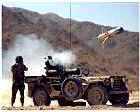Redstone Firsts
The U.S. Army Aviation and Missile Command and its predecessors achieved several
significant "firsts" in the history of rocket and guided missile development and space exploration.
|
November 1951 A NIKE AJAX missile intercepted an aircraft flying at 15 miles range, 33,000 feet altitude, and 300 miles per hour, marking the first successful kill of an aerial target by a U.S. guided missile. |
 |
|
August 1953 The U.S. Army's first successful heavy ballistic missile, the REDSTONE, was launched from Cape Canaveral, Florida. |
 |
|
September 1956 The JUPITER C achieved the first deep penetration of space with an altitude of more than 682 miles and a range of 3,355 miles. |
 |
|
May 1957 The first JUPITER missile was fired successfully at the Atlantic Missile Range, marking the first successful firing of an intermediate range ballistic missile in the Western World. |
 |
|
August 1957 The first scale-model JUPITER nose cone was recovered from outer space. President Eisenhower later displayed the nose cone in a nationally televised address. |
 |
|
January 1958 The Army Ballistic Missile Agency launched the free world's first satellite, EXPLORER I, whose payload discovered the cosmic radiation belt identified by Dr. James A. van Allen. |

|
|
May 1958 A HAWK missile successfully engaged an F80 jet target flying at treetop level at White Sands Proving Ground, New Mexico. This was the first intercept of very low altitude aircraft. |
 |
|
March 1959 JUNO II Vehicle 14, the second Army missile to carry a NASA lunar experiment, lofted the PIONEER IV on a trajectory past the moon and into orbit around the sun--the first U.S. solar satellite. |
 |
|
May 1959 Monkeys Able and Baker, passengers in a JUPITER nose cone, became the first living beings to be recovered alive from a flight into outer space, paving the way for putting the first man into orbit around the earth. |
 |
|
January 1960 The HAWK antiaircraft guided missile intercepted an HONEST JOHN artillery rocket to become the first missile to shoot down another missile at supersonic speed. |
 |
|
June 1960 A NIKE HERCULES antiaircraft guided missile tracked and shot down a CORPORAL ballistic missile at White Sands Missile Range, marking the first ballistic missile to be killed by a missile. |
 |
|
October 1965 Two CONUS Strategic Army Corps Basic HAWK battalions (eight firing batteries) were deployed, marking the first surface-to-air missile system to be placed at the front in the Vietnam War. The Hawk units were never fired in combat, but the Hawk radars were used in air defense surveillance. |
 |
|
June 1967 First combat firings of U.S. Army missiles occurred during the Six Day War, when Israeli troops downed several Egyptian jets with HAWK missiles. |
 |
|
May 1972 The first American-made guided missile was fired by U.S. soldiers in combat near Kontum, Vietnam, when airborne TOW antitank missiles destroyed four captured American M41 tanks, an artillery gun, and a truck. |
 |
|
October 1983 The first deployment of STINGER under combat conditions occurred during the U.S. airborne assault on Grenada. |
 |
|
September 1988 In accordance with the provisions of the INF Treaty and the approved schedule, the stand down of the first PERSHING II USAREUR battery began. The U.S. Army began eliminating PERSHING missile rocket motors as prescribed in the treaty on 8 September 88, when a PERSHING II and a PERSHING 1a first stage motor were static fired at Longhorn Army Ammunition Plant, Texas. Following the firings, both cases were placed in a hydraulic crusher and flattened. |
 |
|
July 1989 The 169th and last PERSHING 1a nuclear-tipped missile was destroyed at Longhorn Army Ammunition Plant, Texas, marking the first time an entire class of nuclear weapons had been eliminated. |
 |
|
January 1991 A PATRIOT antimissile missile intercepted an Iraqi SS-1 ("Scud") missile fired at Riyadh, Saudi Arabia, to become the first anti-tactical ballistic missile fired in combat. |
 |
